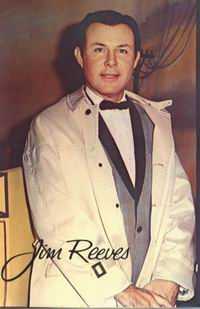Born: 8/20/1923 Birthplace: Panola County, TX Deceased: 7/31/1964 Year of Grand Ole Opry Membership: 1955 Year in Country Music Hall of Fame: 1967
Jim Reeves' smooth, pop-flavored stylings helped expand country's boundaries and keep the genre alive during the years when the birth of rock 'n' roll seemed to signal the death of Nashville. Jim recorded a brief 11 years, from 1953 until his death in a 1964 plane crash, yet his music continued to chart into the 1980s, with several Top 10 posthumous hits.
Jim was born on a farm near Galloway, Texas, where he grew up listening to country artists such as Jimmie Rodgers, when he wasn't involved in his first love: baseball. He was the first-string pitcher at the University of Texas playing on an athletic scholarship when he was recruited by the St. Louis Cardinals and sent to play for one of their farm teams.
Unfortunately for Jim's sports aspirations, but fortunately for country music, he soon suffered an injury that sidelined him from the game.
He found a job as a radio announcer, and it was while working as a disc jockey that Jim decided to try his hand at recording. Success came quickly for the artist. By 1953 he'd moved to the Louisiana Hayride and had No. 1 hits with "Mexican Joe" and "Bimbo" on Abbott Records. In 1954, Jim embarked on a worldwide USO Tour, entertaining U.S. troops for the first of many times. His worldwide acclaim continued throughout his career and extended to overwhelmingly successful tours in both Europe and Africa. (Country histories point out that in Norway alone, Jim Reeves earned in excess of 16 gold, silver and platinum albums in the 1960's.)
In 1956, RCA signed him to a contract, and his nine shining glory years began. After five Top 10 hits, including 1957's best selling "Am I Losing You,'' Jim cut a George Campbell composition, "Four Walls," which stayed at the top of the country charts for two months, and hit No. 11 on Billboard's pop charts. Ironically, Chet Atkins was initially surprised when Jim brought the song to him; since the lyrics alluded to a person waiting at home for a wayward mate, the producer always considered it a woman's song. Jim Reeves saw it differently, and had his first No. 1 on RCA.
"Four Walls" was a classic example of the "Nashville Sound," the marriage between country lyrics and pop arrangements, where fiddle and steel were replaced by rhythm sections, strings and background singers. For some singers, the new sound was devastating, but for a voice such as Jim Reeves, it actually opened the door to more interesting vocal stylings. The presentation is as smooth as silk and at the time, ultra-contemporary on the airwaves.
As a result of his huge crossover appeal, Jim appeared on Dick Clark's American Bandstand, where rock and pop acts were being discovered daily by America's teenagers. American Bandstand appearances, and guest spots on The Ed Sullivan Show, The Steve Allen Show and The Jimmy Dean Show led to even bigger television fame. In 1957 Jim was given his own show on ABC-TV, and he soon became a national household name.
"Blue Boy" was a country and pop hit for the artist in 1958, and inspired the naming of Reeves' band, "The Blue Boys." In 1959, "Home" hit No. 2 for two weeks, but it was just a prelude to the song that became Jim Reeves' signature. On December 7, 1959, RCA released "He'll Have To Go," which shot to No. 1 and was a chart-topping pop single as well. Originally, the song was a B-side record.
